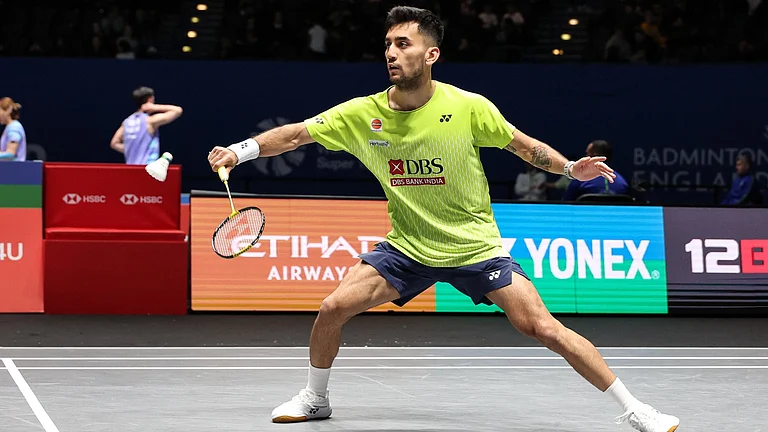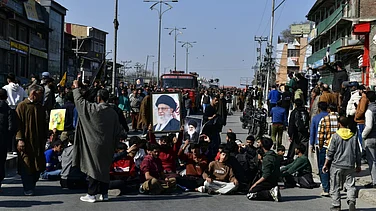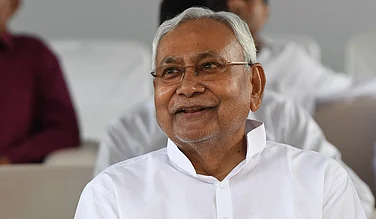Lakhs of hands rise to capture on their mobile phones a glimpse of Bageshwar Baba, also known as Dhirendra Nath Shastri, who has been camping on the outskirts of Patna, delivering Hanuman Katha. Scorching heat of May doesn’t seem to be a deterrent. At the end of the five-day spiritual camp, the devotees may have gone home enlightened, however, the visit stirred up the ‘Politics of Hindu Rashtra’ debate, yet again.
Addressing his devotees, the 26-year-old Baba, the current head of Bageshwar Dham Ashram of Chhatarpur district in Madhya Pradesh, said, “India would inch closer to becoming a Hindu Rashtra when if 5 crore of the 13 crore people of Bihar would apply tilak and go on a march.”
While the statement evoked strong reactions from Bihar Chief Minister Nitish Kumar who said that nobody “can change the name of our nation”, predictably, the Bharatiya Janata Party (BJP) leaders were found bee-lining behind the self-proclaimed godman. Shastri has a formidable base of followers across the country, which includes the Chief Minister of Madhya Pradesh Shivraj Singh Chauhan and many key leaders from the BJP. In 2018, former Chief Minister of Madhya Pradesh and Congress leader Kamal Nath too was captured in a frame along with him.
The founder of Bajrang Sena, a right-wing organisation that is allegedly involved in spewing communal hatred, Bageshwar Baba’s most sermons are pivoted around the proposition of Hindutva and conservative ways of life.
His claims of performing miracles have gained traction among his followers. Last December, he dodged the challenge from Maharashtra Andhasraddha Nirmoolan Samiti, an anti-superstition organisation founded by social activist Narendra Dabolkar, who was allegedly killed by right-wing forces in 2013. As per the media reports, he will also visit Rajasthan and Chhattisgarh—the Congress-ruled poll-bound states in the coming days.
The Baba-Politician Nexus
A few scholars while are of the opinion that it is an attempt by the BJP to polarise the voters in the Congress-ruled states to gain back power after its drubbing in Karnataka, the connection of self-proclaimed babas with major political parties is not new. Indira Gandhi’s visit to Mathura-based Devraha Baba as is well-known. Her strongest opponent Jai Prakash Narayan, whose movement led to the formation of first non-Congress government in 1977, praised godman Chandraswami as “an eminent spiritual seeker and devotee of Bhagawati”.
However, in turns of the decades, Chandraswami was proved to be one of the most defamed Babas as he defrauded a London-based businessman. Known as the spiritual advisor of former Prime Minister P V Narasimha Rao, though he wielded enormous political power, he couldn’t save himself from the wraths of law.
But, is it through the last decade only that the names of godmen and their relation with the politicians are coming up in public domain? Sociologist Santosh K Singh says: “The connection between Babas and politicians have been there for long. In the last decade, it has become visible due to the extensive use of social media and technology.”
The predominance of Babas in the political discourse could be further unpacked through taking the cases of Ramdev and Gurmeet Ram Raheem. Hundreds of such cases though could be referred to, the visible mollycoddling of these Babas with the ruling party make them prominent faces to understand the Baba-politician nexus in current times.
The Entrepreneurial Baba
Ramkishan Yadav, born in 1975 at Syed Alipur, a village in Haryana’s Mahendragarh district, from very childhood knew the tricks to win the game. As per the media reports, he used to use ‘tickle’ as a weapon to defeat his brother in wrestling! This Ramkishan gradually became Ramdev through his training in gurukuls run by the Arya Samaj. Founded in 1875, by Swami Dayanand, Arya Samaj has deep roots in Haryana and their teaching of spirituality and Yoga coupled with anti-Congress-ism for its alleged pro-Muslim role shaped the ideology of Ramkishan.
In 1992, when communal politics grappled northern India, Ramkishan completed his training in Gurukul and joined Kripalu Bagh Ashram in Haridwar, run by Swami Shankardev, and assumed the name Ramdev. Following the path of celibacy, asceticism and renunciation, he became Baba in 1992, but shot to fame only after 2002 when his yoga camps were televised and gained enough traction among audience.
Ramdev’s connection with Sangh and the BJP though could be traced back much before, in 2006 Sarsangachalak KS Sudarshan’s presence as a chief guest at the inauguration of Patanjali Yog Peeth gave it further boost. Senior journalist Kaushik Deka in his book titled The Baba Ramdev Phenomenon notes that he donated Rs 1,100,000 to the BJP before the 2009 general elections. In an interview, Baba Ramdev also claimed that he predicted the victory of the BJP six months before the 2014 elections.
His contributions, however, didn’t go unacknowledged. The then Union Finance Minister and senior BJP leader Arun Jaitley said, “The role played by Ramdev in awakening the voters is similar to the struggles of Mahatma Gandhi and Jayprakash Narayan who stayed away from power. He has no greed for any post. His motto is to strengthen the system. Ramdev’s campaign against black money and corruption is similar to those of Mahatma Gandhi and Jayprakash Narayan.”
Union Home Minister Amit Shah also recognised Ramdev’s first contribution to the formation of the first Modi government. It was, nevertheless, during the anti-corruption campaign against the UPA II government that shot him to fame. While a few criticised him for fleeing the ground to evade arrest, it was evident that such tricks worked for his future prosperity.
In 2014, he was given Z-category security for “his vulnerability to attacks from his opponents”. A year later, the government offered his Yoga Ashram paramilitary security—a very rare facility for a private entity, notes Deka. In 2016, the Defence Research and Development Organisation (DRDO) declared its interest to tie up with Patanjali “to market herbal supplements and food products made by the organisation.”
The Central government’s decision to stock Patanjali’s product in the government-run Kendriya Bhandars, coupled with several facilities and subsidies it gets from Uttarakhand and Madhya Pradesh government, made it one of the fastest- growing companies in the country. Interestingly, after the Coronil controversy (Ramdev claimed Patanjali’s Coronil could cure Covid) though their financial growth dipped for a while, media reports from 2022 notes that Patanjali is expecting a turnover of Rs 1 lakh crore in coming years.
This financial and political benefits that Babas reaped from the parties is not limited to Ramdev only. Gurmeet Ram Raheem, who is currently in jail for 20 years upon his conviction for rapes of two Sadhvis and murder of a journalist and the manager of his Dera known as Sacha Sauda, also got lucrative support. On his 50th birthday, not only several ministers of Haryana wished him, one of them even gifted his organisation Rs 5.1 million to develop a sports facility within his camp.
Ram Raheem, known as an actor, producer and musician, cannot be called just a Baba. Professor Singh calls him and the likes of him ‘entrepreneurial gurus’. “Ram Raheem and these gurus who have a separate clientele base could be called entrepreneurs,” says Singh who has been working on caste among Sikhs in Punjab for decades.
The support of ruling parties extended to Ram Raheem also couldn’t be undermined. In the last 14 months, he was granted parole four times. The most significant one, however, was his parole just before the Punjab Assembly elections. Singh, in his recently-published research paper, points out how the ruling parties thought that the influence of Ram Raheem would work in their favour.
Notably, Ram Raheem is the third guru of the Dera. The earlier two—Mastan Singh and Satnam Singh—always maintained low profile. It was Ram Raheem who wore multiple roles on his sleeves.
It is commonly believed that the Deras in north and north-western India are mostly dominated by Dalits. Debunking this myth, Singh says: “There are a few Deras that express their caste identity but there are several who don’t operate on the basis of it.” However, the gathering of lower caste and lower-class people in Deras make its politics significant.
The lack of integration of marginalised communities into the mainstream religion make Deras a significant place for accommodation, notes Singh. Is it because of the state’s failure to serve the people the basic facilities that such religious camps are gaining strength? “Ram Raheem focused on two areas—firstly, the blood donation camps and secondly, de-addiction efforts. As addiction among Punjab youths is a major issue, addressing it was a popular measure,” Singh adds.
The case of Sri Sri Ravi Shankar is not also different. On different occasions, he was found to praise Prime Minister Narendra Modi. In an earlier interview, he said that Modi was unjustly bashed by the people throughout years. His organisation Art of Living (AOL) though suffered several setbacks, nothing could deter his progress and popularity.
In 2001, the Karnataka High Court heard a Public Interest Litigation (PIL) against AOL for constructing huge structures on water-spread bodies and later it was allegedly found that he had encroached on 6.53 acres of the tank area. In 2010, an NRI also accused Sri Sri for illegally taking over his 15 acres land. That none of the result of the case was made public, as the media reports note, make his political clout evident. In 2015, when the National Green Tribunal (NGT) levied Rs 5 crore penalty for violating environmental norms, he clearly said that he would go to jail but wouldn’t pay a single penny.
These incidents, nonetheless, couldn’t impact his growth and immense popularity. Sri Sri as an icon was rather bestowed with different international awards for being the messenger of peace.
Why are common people glued to Babas?
What are the major factors that glue the people to these Babas? Does it have any relation with the emergence of Hindutva and coming of the BJP to power? Singh denies such relations and notes. “In case of Deras, all of the political parties visit it. They consider it as formidable vote bank. From Congress, AAP, Akalis to the BJP, none shy away from taking help of the Deras,” he says.
However, political scientist Ajay Gudavarthy senses a transition in the behaviour of the gurus. “While earlier, it was more spiritual; now you can find hypermasculine, toxic and genocidal language used by these Babas. This is definitely due to the changing political situation,” he says.
The major reason for peoples’ faith on these Babas, nevertheless, comes from the crisis of modernity where faith becomes empowering, notes the author of Economic and Political Weekly (EPW) paper Modernity and Godmen. “Another factor that actually drives the people is the idea of immediate concrete solution given by these Babas. Bageshwar claims to read the minds and offers hand-to-hands resolution,” Gudavarthy adds.
Interestingly, in between 1995 and 2007, the cases of diabetes doubled in India and it was the moment when Baba Ramdev came up with weekly camps that would offer the people immediate solution. The recent inclination of people to get immediate justice/ hand-on results could be found even in the celebration of spate of encounters in India.
The creation of the clientele from across the globe, nonetheless, Singh notes, has a different ground. “In the post-Covid period, the major illness that affected the people of the US is loneliness. They have solved their economic crisis and now find solace in Yoga and other spiritual performances. They are joining in numbers as the devotees of these Babas,” he notes.
In this context, the popularity of Baba Bageshwar is significant as his visits to the poll-bound states would be observed closely to see whether the Baba-politics nexus actually pops up its head to polarise the voters.























